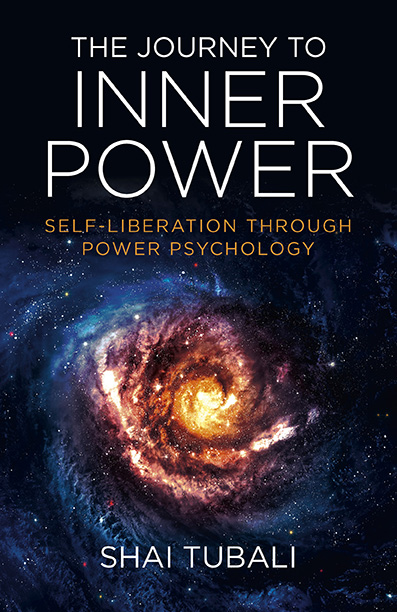Journey to Inner Power, The
The Journey to Inner Power: Self-liberation through Power Psychology turns a direct encounter with our deepest unconscious drives into an opportunity for inner transformation.

The Journey to Inner Power: Self-liberation through Power Psychology turns a direct encounter with our deepest unconscious drives into an opportunity for inner transformation.
The Journey to Inner Power: Self-liberation through Power Psychology turns a direct encounter with our deepest unconscious drives into an opportunity for inner transformation.
Applied psychology, Inspiration & personal growth, Self-esteem
If we could take the most intense and penetrating look into our psyche and strip away the layers, what would we find at our very core? Could we find the key to psychic heath that unlocks our full creativity and potential? Working with hundreds of people around the world, therapist and author Shai Tubali came to realize that it was power that drove the human psyche: the primal urge for power, the loss of power, and the entangled and confused desires to regain power in our lives. Tubali created 'psycho-transformative processes' to enable the men and women he worked with to uncover these hardest, hidden and most denied parts of the self, and then guided them to transform these parts into a source of true, revitalizing inner power. The Journey to Inner Power sets the reader on this challenging new path to self-knowledge and self-liberation.
Click on the circles below to see more reviews
Subtitled ‘self-liberation through power psychology’ and written from a p s y c h o t h e r a p e u t i c background, this impressive book updates and extends the psychology of Friedrich Nietzsche based on the will to power as the fundamental driver of the human psyche. Nietzsche maintains that anything living is an incarnate will to power: ‘it will strive to grow, spread, seize, become predominant - not from any morality or immorality but because it is living and because life simply is will to power.’ This is an expression of the instrumental or even exploitative attitude and a question that has engaged thinkers down the ages. Albert Schweitzer resolved it through his philosophy of reverence for life, whereby life devotes itself to life, while Arnold Toynbee found that spiritual love was the only force capable of overcoming the self-centredness inherent in being alive. The three parts of this book explain the nature of the will to power, power psychology and inner transformations. Readers will bring their own life experience of relative power and powerlessness to the reading of the book, which will fundamentally influence how it is interpreted. Proponents of the theory will claim that those who refuse its truth are emotionally resistant and self-deceiving. This may be partly true, and it is certainly the case that the psychology of power explains many fundamental aspects of life, but not the whole of it - or does it? This is the key question raised and pursued in this book. The will is central to human life and the personality is in a sense a compromise between personal will to power and culture. In a spiritual sense, the will to power must be harnessed for the sake of self-growth. However, before that there are many phases to go through, which are clearly set out and explained: the primal narrative, replacement, compensation, vengeance and concealment - much of this is, of course, unconscious, but the patterns are clear in the examples given from the author’s psychotherapeutic practice. Will to power is fundamental in the political arena, but it is frequently disguised by the narrative of the victim and the perception that a country is endangered by an enemy; all this creates a smokescreen ‘that makes it possible for them to continue with their violent acts.’ One can see the truth of this historically but also in the contemporary scene. Tubali understands trauma and aggression as two sides of the same coin, with one representing powerlessness and the other and book reviews www.scimednet.org Network Review Spring 2015 51 imposition of power; again, the history of violence and sexual abuse demonstrates this dynamic. Despite all this, the author maintains that we can achieve inner power and explains the various processes involved. At the end of the book, he arrives at the point where the expansion of consciousness is the ultimate transformation that also fulfils the greatest yearning of the will to power in a corresponding feeling of empowerment. Instead of projecting one’s power outwards, one focuses on becoming an internal ruler of reality and one has in a sense overcome oneself, which is what Nietzsche was ultimately talking about. The book is a challenging but illuminating read. ~ David Lorimer, Paradigm Explorer
I am highly impressed with "Journey to Inner Power" and I can personally testify to the transformative potential that Shai Tubali's new approach to the human psyche contains - it has greatly impacted both my work and my private life. ~ Theresa Bäuerlein, journalist and author of Das war der gute Teil des Tages
Since I have learnt Shai Tubali's Power Psychology principles, I apply them in my clinic with impressive results. It seems that patients are beneffiting alot from the understanding that before any setback there was first and foremost a will, and that through assuming total responsibility they can heal and let go of past traumas. In my opinion it is a great aid for analyzing the source of emotional difficulties, and applying the right solutions for emotional unresolved issues. it seems to release much of the energy that was stuck in the past, and enable it to flow into a new direction, one of growth and empowerment in one's personal life. ~ Dr. Nir Brosh, M.D., RCHom